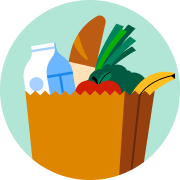
Fast delivery
Get in as fast as 1 hour

It’s all local
Shop your favorites

Direct chat
Connect with shoppers
Fresh Lemons for Delivery or Pickup
The Instacart guide to lemons
Lemons add a bright splash of color and flavor to meals, drinks, and desserts. Instacart makes it easy to have fresh lemons delivered any time of year. Use the Instacart app to add lemons to your cart, and our friendly shoppers will do the rest. In many cases, you can have your order delivered in as little as 2 hours!
About lemons
Originally brought to the Americas by Christopher Columbus, lemons are an essential part of American cooking. Lemons add a fresh, acidic pop to any recipe and lighten heavy dishes. In America, lemons are primarily grown in California, Arizona, and southern Florida. The main lemons you will see on the market today include:
- Eureka and Lisbon lemons: These two are the standard, bright yellow lemons found on supermarket shelves.
- Pink lemons: These have yellow and green striped skin with unique pink flesh. Pink lemons are sweeter and have more floral flavors than the standard Eureka and Lisbon lemons.
- Meyer lemon: A Meyer lemon is a cross between a lemon and an orange. Meyer lemons are sweeter than the Eureka and Lisbon varieties.
- Seedless lemons: This specially-bred lemon is naturally seedless, but otherwise the same as a Eureka or Lisbon lemon.
The average lemon has 29 calories, three grams of fiber, one gram of protein, no fat, and can provide a significant dose of your daily vitamin C. The vitamin C in lemons also helps your body absorb iron more efficiently.
How to pick out lemons
When choosing a Eureka, Lisbon, Pink, or Seedless lemon, look for bright yellow skin free of spots or cuts. Avoid lemons with a green hue. Pink lemons are ripe when the green stipe fades. Ripe lemons feel heavy for their size and are firm to the touch. Avoid soft or discolored lemons.
How to store your lemons
Keep your lemons at room temperature on the kitchen counter if planning to use them in a week or less. Room temperature lemons will produce the most juice. Lemons kept in the refrigerator crisper will last up to two weeks. Wrapping your lemons in plastic wrap or a freezer bag will prevent them from drying out, keeping them fresh for a month or more. Freeze lemon juice and zest in an ice cube tray for later use. Whole lemons do not freeze well.
Before use, check your lemons for spoilage. Spoiled lemons may be soft, mushy, or slimy. Other signs your lemons are spoiled include discolored skin and an unpleasant aroma. If a lemon has dried out, the skin will feel leathery and hard. A dry lemon may still be usable but won't produce as much juice as its fresh counterpart.
Lemons Near Me
Buy your favorite Lemons online with Instacart. Order Lemons, Meyer Lemons, Pink Lemons, and more from local and national retailers near you and enjoy on-demand, contactless delivery or pickup within 2 hours.
FAQs about lemons
Preserved lemons are used in Moroccan and Middle Eastern recipes. They are also a great addition to sauces, syrups, salad dressings, marinades, grilled meats, and beans. Preserving lemons is very easy, and you only need a jar, kosher salt, lemons, and lemon juice. You can also add vanilla beans, cloves, cinnamon sticks, peppercorns, and ginger to preserved lemons.
Fill the bottom of a jar with salt. Cut the lemons into quarters or thick slices and cover them with salt. Pack the jar with lemons, pressing down on each one to release their juices. Add enough juice and salt to cover all the lemons and seal tightly. Preserved lemons should be left at room temperature for two to three days and then placed in the fridge for three weeks. Preserved lemons will last for six months to one year.
To use your lemons, rinse off the salt and discard the seeds and pulp. Chop or slice the preserved rind before using it in recipes.
The bright, fresh flavor of lemons pairs well with almonds, chicken, fish, honey, lime, raspberries, and strawberries. Lemon juice is the basis of homemade lemonade and many cocktails. Many salad dressings, sauces, and marinades incorporate lemons. Microwave your lemons for 30 seconds or roll them on the countertop before juicing to get the most juice possible.
Lemon zest adds a bright pop of color and flavor to baked goods, rice, pasta, and frozen treats. Be sure to use only the bright yellow outer rind, as the white pith is too bitter. Lemon wheels, twists, or wedges are also popular in mixed drinks and summer teas.
Lemons are effective bathroom and kitchen cleaners.
- Toss used lemons in the garbage disposal to keep it clean and fresh.
- Rub a cut lemon on your faucets to remove water spots.
- Restore copper pots by rubbing lemon and salt into discolored areas.
- Add lemon peels to cleaning vinegar to make a fresh-smelling, grease-cutting kitchen cleaner.
- Clean your cutting boards and remove stains by scrubbing them with salt and lemons.
- Remove rust spots from silverware by rubbing them with a cut lemon.
- Use lemon juice to remove soap scum from shower doors and bathtubs.















































